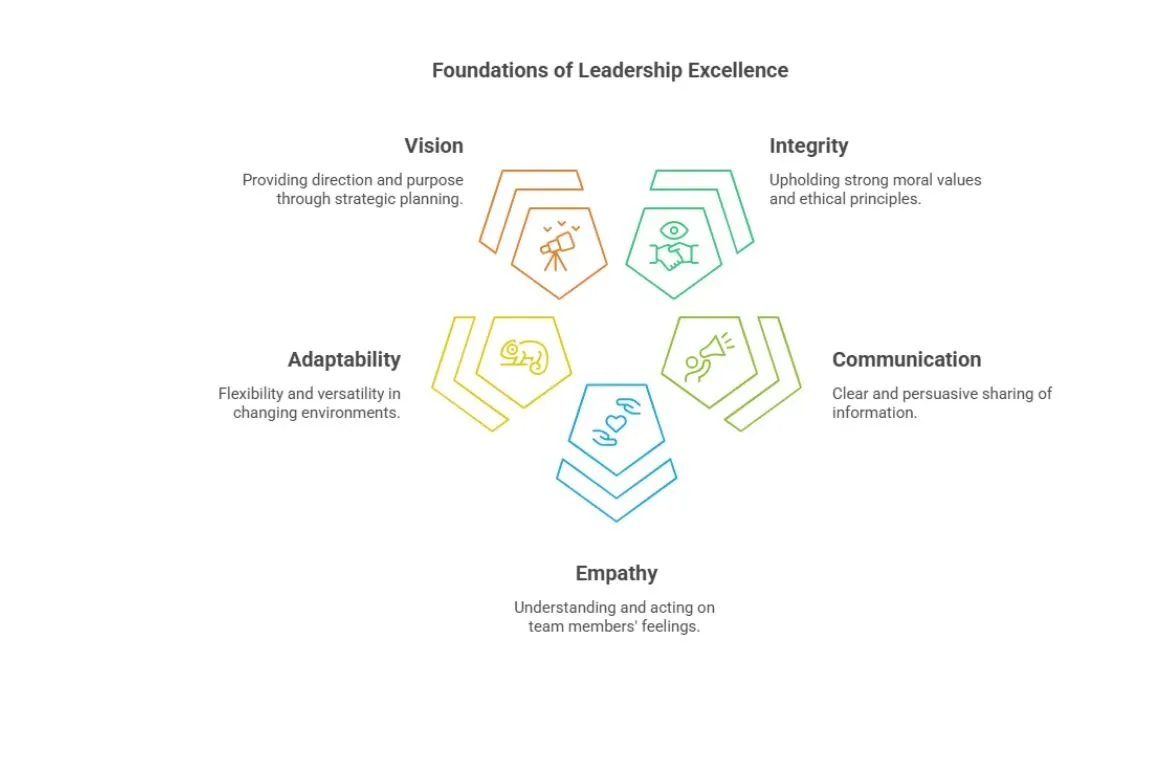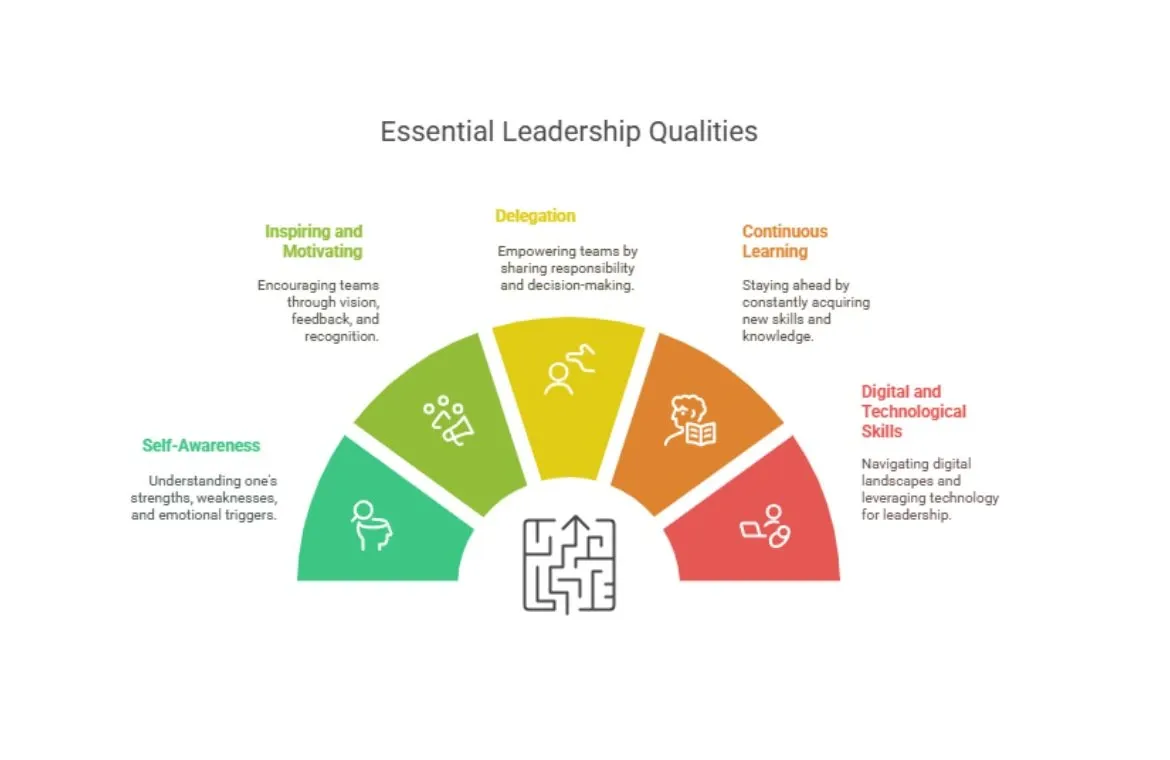Qualities of a Leader

Leadership isn’t about commanding attention, and it’s about earning trust. Great leaders don’t just direct, they inspire, empower, and uplift. They lead with empathy, act with integrity, and stay grounded through challenges. In this blog, we uncover the timeless traits that turn ordinary individuals into extraordinary leaders.
Self-awareness is a vital quality of a good leader. What makes a good leader tick? This blog looks at the basic traits that help regular managers become exceptional leaders. You'll find ways to improve your leadership skills that work in any role. The practical strategies we share will help you build these qualities into your daily work life.
“A good leader leads the people from above them. A great leader leads the people from within them”.
Who is a leader and what does he do?
Leadership exceeds mere job titles. It's a dynamic social process that shapes an organization's path. A leader influences and guides individuals or groups to achieve common goals while promoting growth and development among team members.
What exactly defines a leader? Leaders build confidence and zeal among people. They create an environment where teams willingly strive toward shared objectives. Leaders are visionaries who motivate their teams to reach desired outcomes. They often see possibilities beyond what others might see.
Leaders concentrate on people and inspiration, while managers focus on process and control. A leader's responsibilities fall into three main categories:
- Guiding with Vision
Leaders define clear direction and set achievable goals through long-term strategic planning. They communicate these goals clearly so everyone aligns with the organization's mission.
- Building and Motivating Teams
Great leaders recognize individual strengths. They promote collaboration and create inclusive environments where team members feel valued for their unique traits and skills.
- Decision-Making and Problem-Solving
A leader's role includes quick analysis and tough choices under pressure. These decisions often carry potential risks for the organization.
Leaders shape organizational culture by modeling it themselves. This inspires others to participate. They bridge the gap between management and workers by interpreting policies and representing team interests to higher management.
What are the qualities of a good leader?
Great leaders stand apart from average bosses through specific qualities that help them influence and direct others. Leaders need several core qualities to direct their teams toward success:
Character-based qualities define a leader's core values, principles, and personal traits. These include integrity, accountability, resilience, and courage. The Center for Creative Leadership points out that integrity becomes "especially important for top-level executives who are charting the organization's course".
People-focused qualities help leaders connect with and inspire their teams. Communication, empathy, respect, and relationship-building skills make the difference. Strategic qualities show how well leaders can imagine and implement future plans. Vision, creativity, adaptability, and learning agility let leaders direct through uncertainty and accept new ideas in their organizations.
Operational qualities cover practical skills for day-to-day leadership, such as decision-making, problem-solving, delegation, and resource management.
Different leadership models might emphasize various traits, but certain qualities always stand out:
- Integrity and ethical behavior
- Effective communication
- Vision and strategic thinking
- Empathy and emotional intelligence
- Adaptability and resilience
- Self-awareness
- Knowing how to inspire and motivate
- Decision-making skills
- Commitment to continuous learning
- Developing Digital and Technological Skills
These qualities work in any industry, at any organizational level, and in all leadership situations. Leaders who focus on building these fundamental traits create a solid foundation for success, whatever their role requires.
Core Leadership Traits That Define Excellence

Great leaders possess certain basic traits that set them apart from regular managers. These key traits form the foundation of leadership greatness and help organizations succeed.
Integrity
Integrity is the foundation that supports all other leadership qualities. It means upholding strong moral values and following ethical principles, even during tough times. Leaders who show integrity stay honest and match their words with their actions. They own up to mistakes instead of passing the blame to others. Such behavior builds trust and credibility.
Integrity's effects reach beyond personal connections. Leaders with this quality:
- Build an ethical culture
- Help teams perform better through trust
- Make decisions that benefit everyone involved
- Keep organizations stable during tough times
Communication
Clear communication is an essential part of great leadership. Your business success depends on it. Leaders must do more than just share information; they need to speak clearly, persuade others, and listen well. Top leaders watch their body language. They look people in the eye to build trust and use facial expressions that show warmth.
Open communication proves valuable. Leaders build trust when they speak openly about goals, problems, and opportunities. This creates spaces where staff feel ready to share ideas and work together.
Empathy
A leader's skill to understand their team's feelings and experiences shows empathy. Though often missed as a success measure, studies prove that empathetic leadership helps job performance, especially for mid-level managers and above.
Empathetic leadership needs more than understanding, it demands action based on what leaders learn. People don't feel heard if their leaders ignore their concerns. Understanding paired with action builds trust, boosts teamwork, and keeps people from leaving.
Adaptability
Today's fast-changing business world demands adaptable leaders. They stay flexible and welcome change, adjusting their plans to handle uncertainty.
Adaptability combines flexibility and versatility. Flexible leaders adjust to surprises, while versatile ones handle various tasks and situations well.
Vision
Vision gives teams direction and purpose. Leaders with vision spot opportunities others miss, even during hard times. Good vision needs more than big ideas, and it demands practical steps. Leaders turn their vision into reality through clear goals, strategic planning, and team support. They help everyone understand their part in achieving the bigger picture.
Advanced Leadership Qualities for Modern Challenges

Modern leadership needs more than basic qualities to direct today's complex business world. Exceptional leaders stand apart from good managers through their sophisticated skills.
Self-Awareness
Self-awareness might be the most overlooked leadership quality that shapes all other leadership skills. Leaders with self-awareness know their strengths, limits, and emotional triggers. They understand how their actions affect others. This knowledge helps them make better decisions and handle relationships more effectively.
Inspiring and Motivating
A leader's power to inspire teams boosts engagement and productivity. Great leaders achieve this through clear vision, honest feedback, and recognition of achievements. They show trust in their team's abilities.
Delegation
True delegation gives both responsibility and decision-making power. Unlike task dumping, proper delegation builds team skills and shows trust. Leaders skilled at delegation earn more revenue.
Continuous Learning
Business changes faster than ever, requiring leaders to keep learning new skills. Learning cultures boost employee engagement and job satisfaction. Leaders who embrace learning stay ahead by spotting market trends, driving innovation, and seizing new opportunities quickly.
Developing Digital and Technological Skills
In an era defined by rapid change, global uncertainty, and constant technological disruption, advanced leadership requires more than just people skills, it demands digital intelligence. Modern leaders must be equipped to navigate AI-driven insights, lead remote teams through digital platforms, and make data-backed decisions in real-time. These aren’t just technical abilities; they’re essential leadership qualities for today’s challenges.
How can you inculcate those qualities in your life as a professional?
Leadership qualities don't develop overnight, they need consistent effort and practice. Research shows that leadership is a skill that can be developed. Anyone can develop these vital traits through practice and dedication.
Start with self-assessment and feedback.
Your leadership development starts with an honest self-review assessment tools play a vital role here. Leadership self-assessments and 360-degree feedback create an objective view of your abilities. This reflection will help you make better decisions about your leadership effectiveness and spot personal blind spots.
Set personal development goals.
A structured growth plan comes after spotting areas to improve. Create a one-month daily leadership improvement plan that targets one weak area. List specific, doable actions you'll commit to. Best practices suggest you ask yourself: "Where does the organization need to go, and how can leadership development support it?" This helps your personal goals match broader organizational needs.
Practice leadership in small ways daily.
Daily habits shape your leadership development. Take daily "pulse checks" of your team or organization. Simple check-ins, watching behavior, or listening better can make a difference. Self-reflection matters too. Ask yourself: "What did I do well today?" and "How can I improve things that weren't done well enough?" These small actions add up to major leadership growth over time.
Seek mentorship and coaching.
Top athletes have coaches, leaders should too. Development experts say coaching relationships excel in business settings. A coach reviews your leadership skills, plans, and goals while offering industry-specific guidance. Mentors guide your leadership trip. They create a safe space for new ideas and career discussions.
Invest in leadership training programs.
Specific leadership skills require formal education. Companies with leadership development programs see much higher revenue. Look into leadership courses, workshops, seminars, and certifications to build key skills. Programs that mix theory with real-life practice and knowledge of the digital world work best. They help you apply what you learn effectively.
Conclusion
Leadership today goes beyond charisma or decision-making, it demands a deep understanding of the world we now live in: one driven by digital disruption and artificial intelligence. The qualities of a great leader, vision, adaptability, emotional intelligence, and strategic thinking, are now deeply intertwined with technological fluency and digital insight.
Leaders must not only inspire people but also navigate rapid innovation, make data-informed decisions, and champion ethical tech practices. This is where specialized programs like AI for Leaders and Digital Business Leadership come into play. These courses don’t just teach you about algorithms or digital strategies, they help you develop the mindset of a modern leader, one who can balance technology with empathy, and innovation with impact.
You can develop leadership qualities through focused growth. Your dedication to self-assessment, goal-setting, and daily practice will accelerate your leadership growth by a lot. Mentorship and formal training create well-laid-out paths to become skilled at advanced qualities like accountability and self-awareness.
Note that leadership goes beyond position or title, it comes from your character and how you affect others. The path from average boss to inspiring leader needs dedication, but the rewards are beyond measure. Your leadership growth begins when you identify areas to improve and take steady steps forward. Great leaders keep learning, adapting, and evolving continuously.
Frequently Asked Questions
Q1. What is integrity in Leadership?
Integrity serves as the foundation that supports all other leadership qualities. It means upholding strong moral values and following ethical principles, even during tough times. Leaders who show integrity stay honest and match their words with actions. They own up to mistakes instead of passing the blame to others. Such behavior builds trust and credibility.
Q2. What are the 5 Qualities of a good leader?
Five key qualities of a good leader are vision, integrity, empathy, adaptability, and effective communication. These traits empower leaders to inspire teams, navigate change, and drive meaningful, lasting impact.
Q3. Who is the true leader?
A true leader inspires others through action, leads with empathy and integrity, empowers their team, and makes decisions that serve a greater purpose, not just authority, but meaningful impact.

TalentSprint
TalentSprint is a leading deep-tech education company. It partners with esteemed academic institutions and global corporations to offer advanced learning programs in deep-tech, management, and emerging technologies. Known for its high-impact programs co-created with think tanks and experts, TalentSprint blends academic expertise with practical industry experience.



